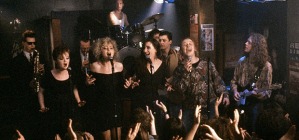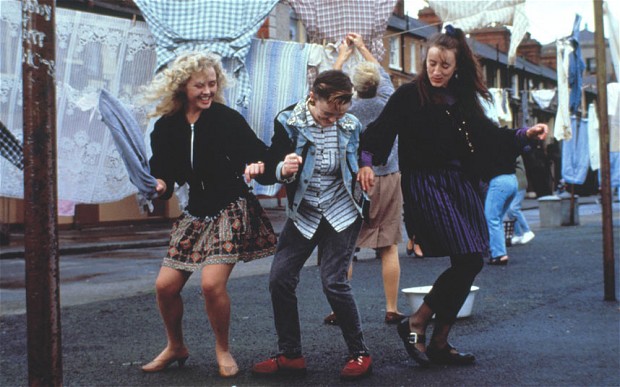One of the great movie experiences of my life was seeing Star Trek the Wrath of Khan when it opened in 1982. I was a huge fan of the original series and when the first film came out I was there on opening day. A lot of people seem to be disappointed in Star Trek the Motion Picture, but I ate it up and the audiences turned out in droves. Despite some lingering negative feelings it was a huge hit. In spite of the fact that Wrath of Khan was the second film in the series, it felt like the film franchise was being rebooted. The action was going to be more dramatic, the uniforms for the Federation were dramatically different, but the best thing about this film was that it would focus so much more on the relationship between the three main characters on the Enterprise.
Admiral Kirk is unsatisfied with a desk position in Star Fleet. Spock is now the Captain of our beloved ship, and Dr. McCoy continues to be the kind of sage friend that both of them need to have in their lives. The film begins with a fake out on the rumored death of Spock, and then gradually refocuses on the melancholy that seems to hang over Kirk as he faces the fact that he is indeed getting older. The Enterprise is a cadet training vessel and it suddenly gets called into service and Kirk, McCoy and Spock are reunited on the bridge that we always want to see them at. There are the usual crew aboard and a new character that held the promise of important things to come. One of the old crew is now the First Officer on another Federation vessel ( or wessel as he was likely to pronounce it) , Captained by actor Paul Winfield. In the process of finding a location for an important experiment, they happen upon an old nemesis of Captain Kirk and the fireworks begin.
So many Star Trek tropes are introduced in this film that it already feels like the start of a new show. This is the film that gave us the Kobayashi Maru, the refusal to accept the No Win scenario, "the needs of the many outweigh the needs of the few", "I have been and always shall be your friend", "Khaaannnn", the old Klingon proverb and a dozen more. Kirk gets a lot of back story with the introduction of two other characters and the effect is to make the film even more personable. The biggest impression however is made by the guest star returning to a character introduced in the original series, Ricardo Montalban. He not only steals the Reliant, he steals the movie with his bare chest and long flowing white hair. Montalban spews out the lines with an elegance at one moment and a spiteful vengeance in the next. He is the embodiment of the genetically engineered superman that supposedly practically conquered earth in the 1990s, two centuries earlier. He mixes Shakespeare and Melville and still is convincing as he outwits and is outwitted by Kirk.
The first time I saw the film was at the National Theater in Westwood on opening day. It was a beautiful wide and large auditorium with a gold motif and curtains. It was famously the Theater where "The Exorcist" first played in Los Angeles, and it was only just now that I discovered it has been torn down for almost a decade. The movie was packed and the sound system was terrific. The impact of the film on me at the time was profound. Characters that I had loved were getting old or dying, the ship that we marveled at is severely damaged, and there is a bagpipe salute that will bring a tear to any stout hearted Trekker.
The Fathom event that put this back in Theaters featured a so called "Director's Cut". Nicholas Meyer who is responsible for putting the movie together with one fourth of the budget of the previous film did a fantastic job in 1982, but there were a few things he was unhappy about. The final scenes of the casket on the Genesis planet were filmed and added against his wishes, he wanted Spock to stay dead. According to the information being screened before the movie, he has subsequently acknowledged that he was wrong and that the scene works for the series. Most of the additions are small moments with a single line or two that elaborate on the characters motivations or fill in a plot element. The best additions were some small scenes that clarified that cadet Preston is Scotty's nephew and then Mr. Scott gets a better dramatic scene after the first attack on the Enterprise.
Before the program this evening, I watched the Original Episode "Space Seed" last night. Khan's impervious nature in that show has given way to personal vendetta in the film, and that works really well given how the plot sets up his situation. William Shatner was interviewed for about twenty minutes as an extra for the event and he was entertaining and eccentric as heck. He conflated a couple of the movies as he was talking about them, but he was an impressively sharp 86 year old. He seems quite vital and he keeps pretty busy. Kirk was always my favorite on the show. Spock was the popular character and I loved Leonard Nimoy, but let's face it, Captain Kirk was about as close as you could get to James Bond in space. He had a string of lovelies across the galaxy and he got to ham it up on a regular basis. His shouting of the name exemplifies the theatricality of his performances but also fits with the nature of his character.
Frankly, I may not stop smiling for a few days. From the first notes of James Horner's score with the Alexander Courage theme woven in, to the Amazing Grace electronic music at the end, I was hooked. This is another commercial for a video release, but it is exactly the kind of value added commercial that makes me want to spend my money and reward everyone involved. The word is given, Warp Speed my friends.


















